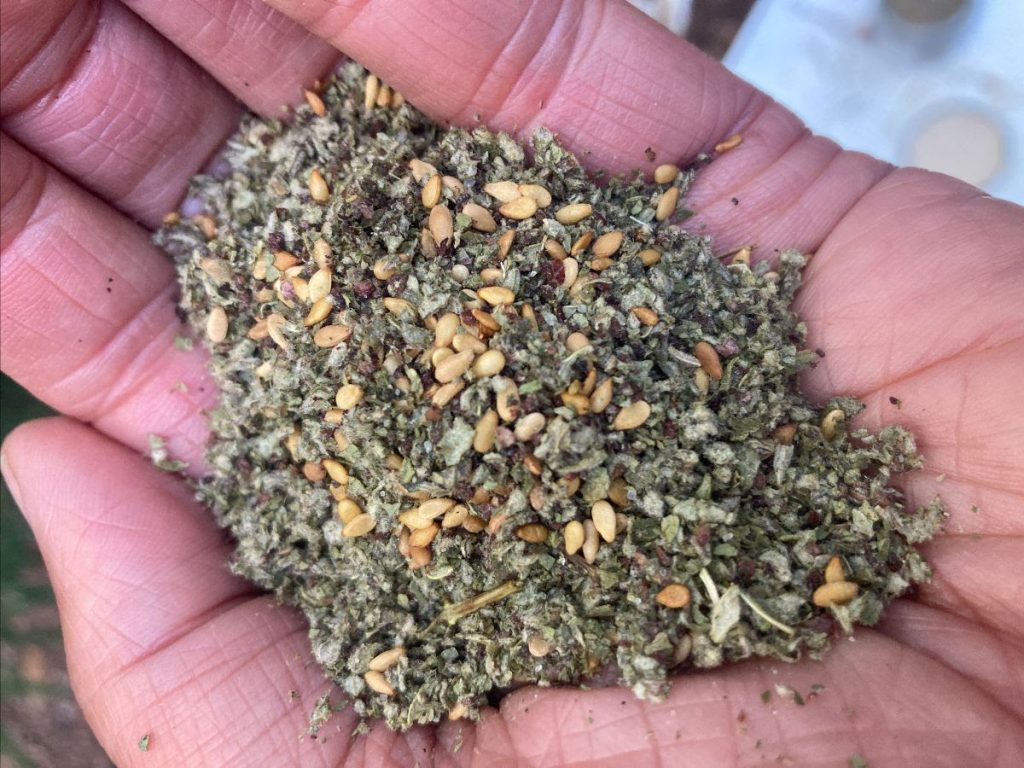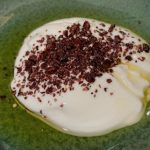Excerpt from Ari’s Top 5 enews
A wonderfully aromatic new arrival from a creative women-powered company
My initial experience of za’atar came when I visited Jerusalem for the first time many decades ago. When my friends and I bought bagelach—round, bagel-shaped rolls—from Palestinian bakeries in the Old City, the people working the counter would hand us a small paper packet filled with za’atar to go with it. We learned quickly: break the bread with your hands, dip the open end in a little olive oil, then push it gently into the za’atar that’s in the paper. It was wonderful. The flavor combination was exceptional, unlike anything else I’d ever tasted. Which is why, all these many years later, I’m so exceptionally excited about having this artisan za’atar from Jordan at the Deli.
The za’atar comes to us through the hard work of Jumana Jacir, founder and owner of Kamā Local Gourmet in Amman, Jordan. She’s got a degree in design from Concordia University in Montreal, Quebec, Canada, but decided to return home to Jordan after graduating to start this business and make a meaningful difference in her homeland. Everything I wrote last week about dignity is embedded in Jumana’s incredible work. Her products are fantastically flavorful, the design of the labels and her retail shop is lovely, and the business is built around empowering otherwise disenfranchised women in Jordan. She and Roya Hakakian, it seems, have a lot in common. Kamā was created to really make a difference: “The goal was women empowerment and education. I wanted to represent women who are underprivileged. Most of the women working at Kamā have never before had the chance to have a job.” As Jumana shares,
We are forever seekers of our homes’ delights. Our hearts yearn to immortalise Arab and Levantine flavours, while our hands constantly innovate, refine, and redefine our culinary narratives. . . . Our land’s heritage is our fortune, and we treasure it by bringing together our food cultures through a passion for crafting things—and crafting them beautifully.
The Kamā za’atar starts with fresh thyme from selected farms, which is cleaned and then handpicked, one leaf at a time. The leaves are left to dry, then rubbed with pure extra virgin olive oil until it soaks in, and mixed with pure sumac, sesame, cumin, and caraway. It’s both aromatic and amazing!
In his new book On Za’atar, Bret Lott shares his first experience with this special spice blend:
I tore off another piece [of bread], pushed it into the spice, took a bite.
Wow.
Later still, I’d figure out to dip the bread first in olive oil, then in za’atar.
It’s all about the za’atar.
Because it’s everywhere, used on pretty much anything. But it’s also a valued element of a dish, not a throwaway spice sprinkled for the sake of sprinkling. I’ve put it on chicken and steak and every roasted vegetable you can think of; on scrambled, fried, and hard-boiled eggs; on pizza and salad and, sometimes, in the morning, simply a piece of toast with olive oil. And every time it tastes like za’atar, and everything tastes more for it.
When you put salt in a dish, and you taste it—and provided you’ve added the right amount of salt—you’ll say, Better.
But when you add za’atar, you’ll say, There.
You can eat the za’atar as I described above by dipping it in oil and bread. Great on salads, pasta, rice, on sautéed vegetables. Super fine with fish or chicken. I love it for marinating olives as well! Great in yogurt, on fresh goat or feta! Be sure to take note of the aroma as well—it’s beyond amazing!!! This is truly a special product that I’m honored to offer. As Bret Lott writes,
Somehow, in this tablespoonful of green and bitter herbs mixed with spices and seeds, I am partaking of the history of my faith, tasting time and place and salvation.
It is a marvelous flavor.



